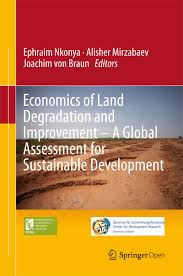
| Judul | Economics of Land Degradation and Improvement : A Global Assessment for Sustainable Development / Ephraim Nkonya; Alisher Mirzabaev; Joachim von Braun (Editors) |
| Pengarang | Nkonya, Ephraim Mirzabaev, Alisher Braun, Joachim von |
| EDISI | 1st ed |
| Penerbitan | New York : Springer Cham, 2016 |
| Deskripsi Fisik | 686p. :ill |
| ISBN | 978-3-319-19168-3 |
| Subjek | SOIL DEGRADATION LAND DEGRADATION DESERTIFICATION SUSTAINABLE DEVELOPMENT ENVIRONMENTAL ECONOMICS NATURAL RESOURCES—MANAGEMENT ECOSYSTEM SERVICES—ECONOMIC ASPECTS |
| Abstrak | 00 billion loss – is borne by land users and the remaining share (62%) is borne by consumers of ecosystem services off the farm. The results in this volume indicate that reversing land degradation trends makes both economic sense, and has multiple social and environmental benefits. On average, one US dollar investment into restoration of degraded land returns five US dollars. The findings of the country case studies call for increased investments into the rehabilitation and restoration of degraded lands, including through such institutional and policy measures as strengthening community participation for sustainable land management, enhancing government effectiveness and rule of law, improving access to markets and rural services, and securing land tenure. The assessment in this volume has been conducted at a time when there is an elevated interest in private land investments and when global efforts to achieve sustainable development objectives have intensified. In this regard, the results of this volume can contribute significantly to the ongoing policy debate and efforts to design strategies for achieving sustainable development goals and related effortsto address land degradation and halt biodiversity loss. |
| Bentuk Karya | Tidak ada kode yang sesuai |
| Target Pembaca | Tidak ada kode yang sesuai |
| Lokasi Akses Online |
https://link.springer.com/book/10.1007/978-3-319-19168-3 |
| No Barcode | No. Panggil | Akses | Lokasi | Ketersediaan |
|---|---|---|---|---|
| 124225192 | 333.76 Eco | Baca Online | Perpustakaan Pusat - Online Resources Ebook |
Tersedia |
| Tag | Ind1 | Ind2 | Isi |
| 001 | INLIS000000000161334 | ||
| 005 | 20250505013715 | ||
| 007 | ta | ||
| 008 | 250505################|##########|#|## | ||
| 020 | # | # | $a 978-3-319-19168-3 |
| 035 | # | # | $a 0010-0525000106 |
| 082 | # | # | $a 333.76 |
| 084 | # | # | $a 333.76 Eco |
| 245 | # | # | $a Economics of Land Degradation and Improvement : $b A Global Assessment for Sustainable Development /$c Ephraim Nkonya; Alisher Mirzabaev; Joachim von Braun (Editors) |
| 250 | # | # | $a 1st ed |
| 260 | # | # | $a New York :$b Springer Cham,$c 2016 |
| 300 | # | # | $a 686p. : $b ill |
| 520 | # | # | $a This volume deals with land degradation, which is occurring in almost all terrestrial biomes and agro-ecologies, in both low and high income countries and is stretching to about 30% of the total global land area. About three billion people reside in these degraded lands. However, the impact of land degradation is especially severe on livelihoods of the poor who heavily depend on natural resources. The annual global cost of land degradation due to land use and cover change (LUCC) and lower cropland and rangeland productivity is estimated to be about 300 billion USD. Sub-Saharan Africa (SSA) accounts for the largest share (22%) of the total global cost of land degradation. Only about 38% of the cost of land degradation due to LUCC - which accounts for 78% of the US$300 billion loss – is borne by land users and the remaining share (62%) is borne by consumers of ecosystem services off the farm. The results in this volume indicate that reversing land degradation trends makes both economic sense, and has multiple social and environmental benefits. On average, one US dollar investment into restoration of degraded land returns five US dollars. The findings of the country case studies call for increased investments into the rehabilitation and restoration of degraded lands, including through such institutional and policy measures as strengthening community participation for sustainable land management, enhancing government effectiveness and rule of law, improving access to markets and rural services, and securing land tenure. The assessment in this volume has been conducted at a time when there is an elevated interest in private land investments and when global efforts to achieve sustainable development objectives have intensified. In this regard, the results of this volume can contribute significantly to the ongoing policy debate and efforts to design strategies for achieving sustainable development goals and related effortsto address land degradation and halt biodiversity loss. |
| 650 | # | # | $a DESERTIFICATION |
| 650 | # | # | $a ECOSYSTEM SERVICES—ECONOMIC ASPECTS |
| 650 | # | # | $a ENVIRONMENTAL ECONOMICS |
| 650 | # | # | $a LAND DEGRADATION |
| 650 | # | # | $a NATURAL RESOURCES—MANAGEMENT |
| 650 | # | # | $a SOIL DEGRADATION |
| 650 | # | # | $a SUSTAINABLE DEVELOPMENT |
| 700 | 0 | # | $a Braun, Joachim von |
| 700 | 0 | # | $a Mirzabaev, Alisher |
| 700 | 0 | # | $a Nkonya, Ephraim |
| 856 | # | # | $a https://link.springer.com/book/10.1007/978-3-319-19168-3 |
| 990 | # | # | $a 124225192 |
Content Unduh katalog
Karya Terkait :